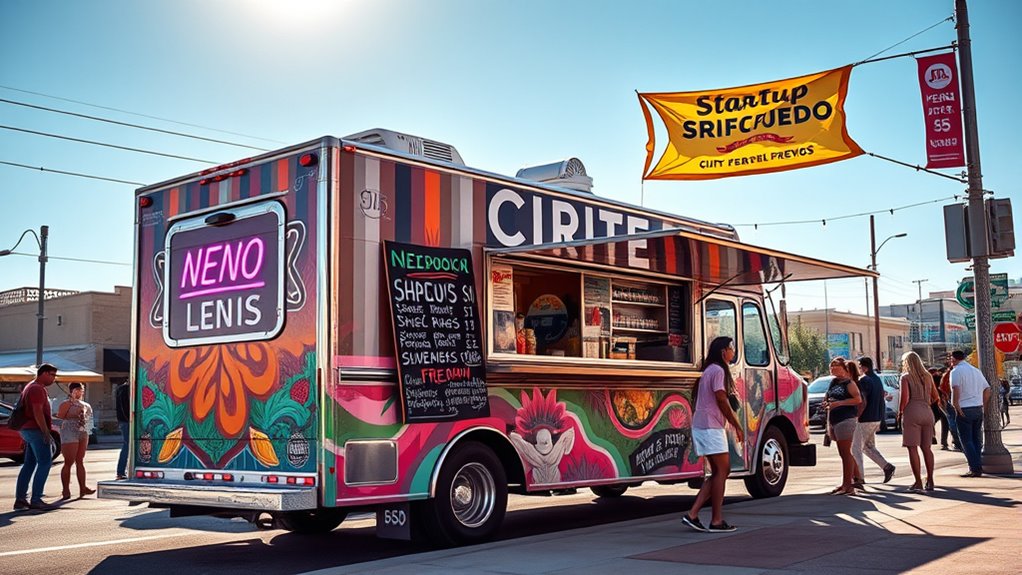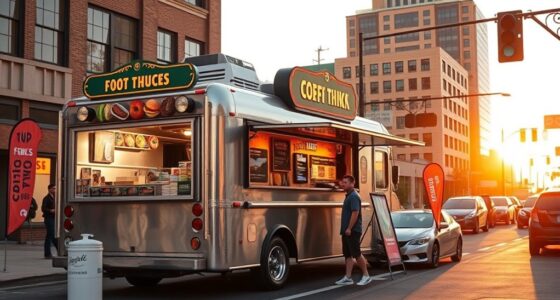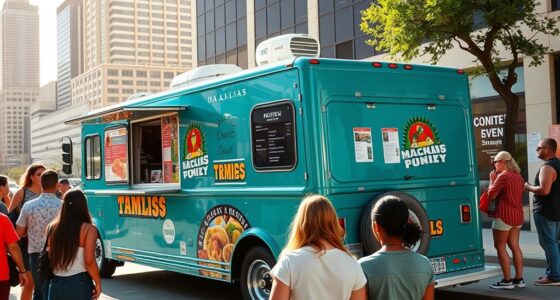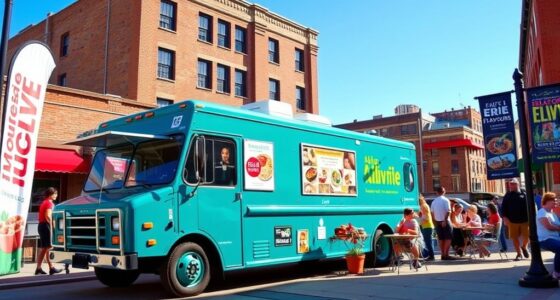To start your food truck in Reno, Nevada, you’ll need to secure a Mobile Vendor Permit and a Health Permit, which involve submitting applications, site plans, and passing inspections—costs can be around $166 annually plus additional fees. Find approved locations through online listings and municipal zones, and plan your menu to meet safety standards. Focus on branding and social media to attract customers, and stay compliant with local regulations. For detailed steps, keep exploring how to make your business thrive.
Key Takeaways
- Obtain Mobile Vendor and Health Permits, submit applications early, and ensure compliance with city zoning and parking regulations.
- Budget approximately $166 annually for permits, plus additional costs for licenses, event permits, and parking agreements.
- Secure approved parking spots through platforms like FoodParks.io and establish partnerships with private lots and campus locations.
- Develop an appealing menu, adhere to food safety standards, and train staff in hygiene protocols to ensure regulatory compliance.
- Build brand awareness via social media, participate in local events, and implement targeted marketing strategies to attract customers.
Understanding the Necessary Permits and Licensing Requirements
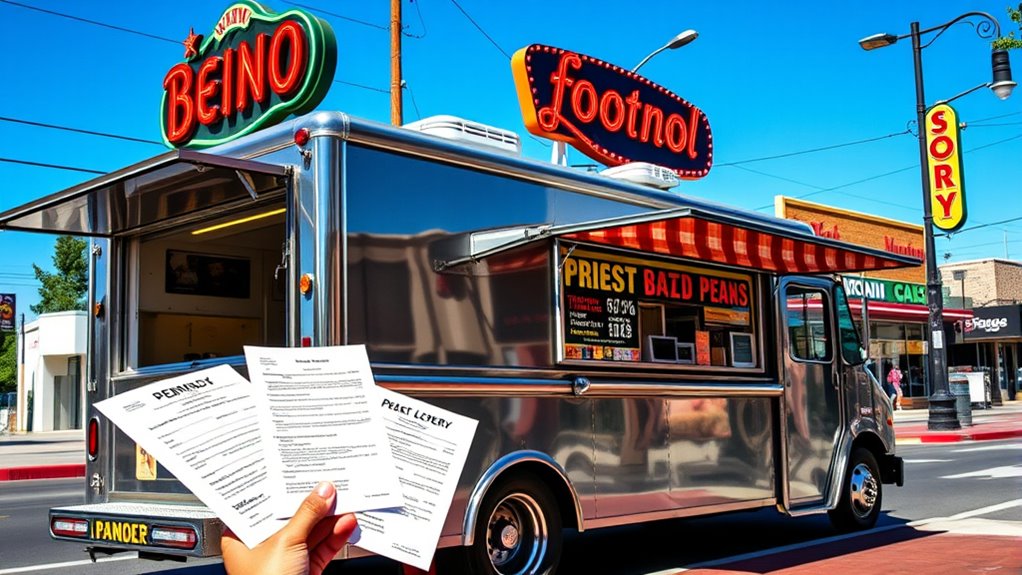
Are you planning to operate a food truck in Reno? First, you’ll need a Mobile Vendor Permit, which allows you to work from your vehicle or movable structure. You’ll have to submit a complete application with business details and your planned locations. One permit covers multiple approved sites, but fixed locations usually need separate permits. If you plan to participate in special events, you’ll need pre-approval for each location. Operating without this permit can result in hefty fines, stop-work orders, or even charges. Additionally, you’ll need a Health Permit to Operate from the Northern Nevada Public Health (NNPH). This involves forms, site plans, and photos. Once approved, your mobile unit must pass initial and routine inspections. Ultimately, you need a Food Establishment Permit if your mobile unit serves food for individual portions, ensuring compliance with state laws. Understanding industry trends can help you stay compliant and competitive in the local market.
Navigating Costs and Processing Times for Permit Approval
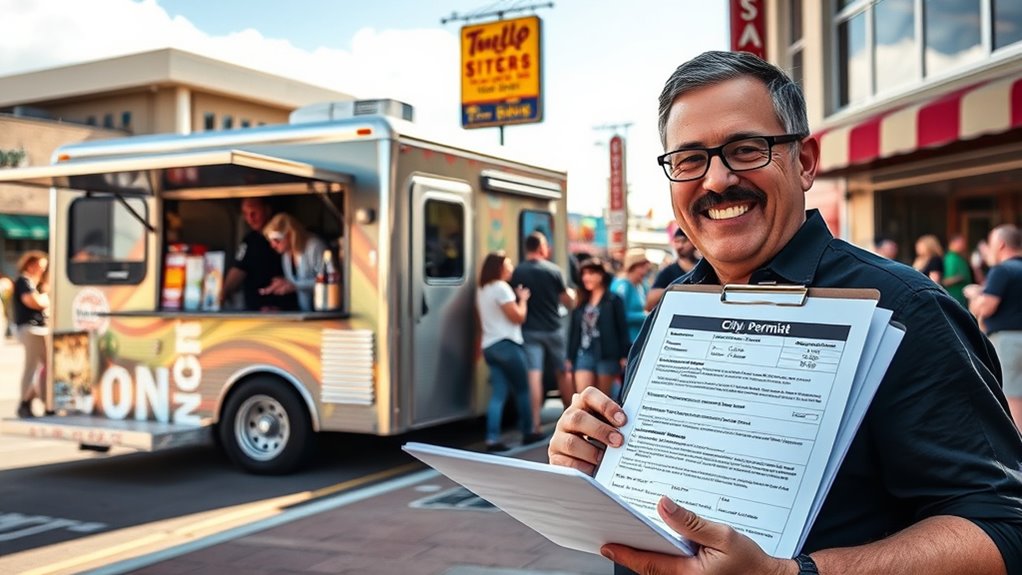
Understanding the costs and processing times for food truck permits in Reno is essential for planning your launch smoothly. The annual permit fee is about $166 per mobile unit, with extra charges for plan reviews, remodeling, or special features like drive-in windows. Vendor license fees range from $100 to $300 yearly, depending on your business specifics. Temporary event permits cost $50 plus $350 per day, but each event requires a separate application. Processing times vary: standard permits take 2-4 weeks, while health department approvals may extend to 6-8 weeks. To avoid delays, submit applications at least 30 days before events, ensuring all documentation and background checks are complete. Planning ahead minimizes risks of fines, shutdowns, or missing key opportunities.
Identifying Approved Locations and Servicing Areas
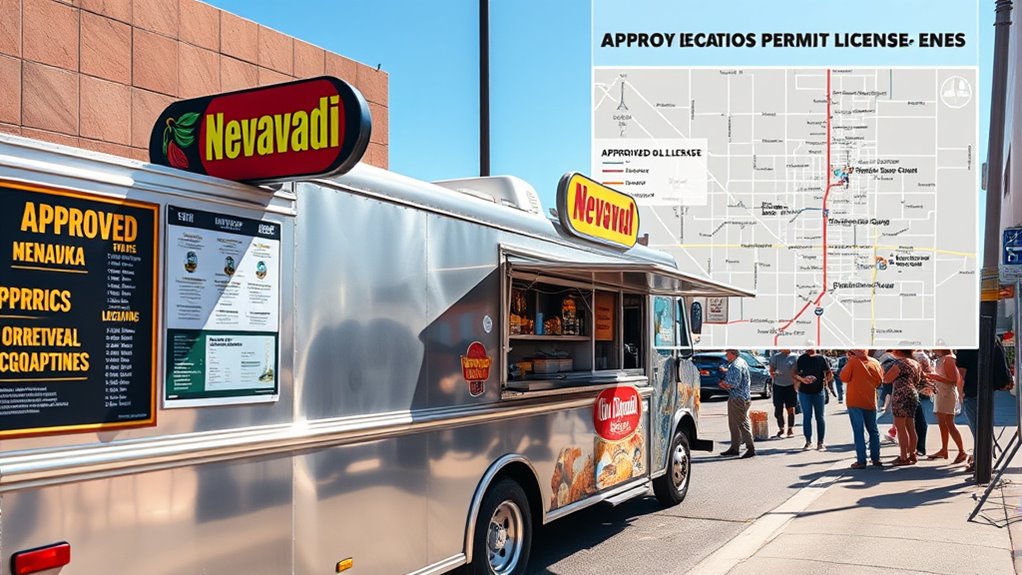
To operate legally in Reno, you need to identify approved locations and secure designated parking spots. Establishing servicing area agreements with event organizers or property owners is essential to stay within city regulations. Understanding these requirements helps guarantee your food truck stays compliant and reaches your target customers effectively. The city has specific permits and zoning laws that must be followed, which often include designated food truck zones and restrictions on where trucks can park and serve. Additionally, being aware of zoning regulations can help you select suitable locations that align with local ordinances.
Securing Designated Parking Spots
Securing approved parking spots is essential for food truck operators in Reno to guarantee legal and successful operations. You can find designated spaces through platforms like FoodParks.io, which lists available rental spots. On the University of Nevada, Reno campus, approved locations include plazas, alleyways, parking lots, and courtyards, such as Silver 10 Parking Lot and areas near residence halls. Some private lots, like 10505 N Red Rock Rd, permit truck parking but may restrict truck types. These spots often feature amenities like seating and takeaway areas to improve customer experience. Keep in mind, approval from local fire departments and compliance with municipal codes is mandatory. Ensuring your truck is parked in legally designated zones helps you avoid fines and operational disruptions. Secure designated parking is crucial because unauthorized parking can lead to citations and potential shutdowns. Additionally, understanding municipal codes related to food truck operations ensures compliance with all local regulations, preventing future legal issues.
Establishing Servicing Area Agreements
Establishing servicing area agreements is a crucial step for food truck operators in Reno, as these agreements authorize the use of designated facilities for essential functions like food storage, cleaning, and waste disposal. Under Nevada health regulations, you must sign an agreement with a local food establishment, granting permission to store food, clean utensils, dispose of grease, and maintain your vehicle’s sanitary standards. Servicing areas are typically commercial kitchens or restaurants within jurisdiction, and they must pass health inspections before approval. If the servicing area stops operating or changes ownership, you must notify health authorities immediately and find a new agreement. These agreements are essential for complying with health codes and obtaining your mobile food permit, ensuring your operations run smoothly and legally. Mobile units are required to operate out of an approved servicing area to meet health standards and ensure proper support for food safety. Additionally, understanding Gold IRA regulations can help ensure your investment activities remain compliant with current laws and avoid penalties.
Developing a Compliant Menu and Maintaining Food Safety Standards
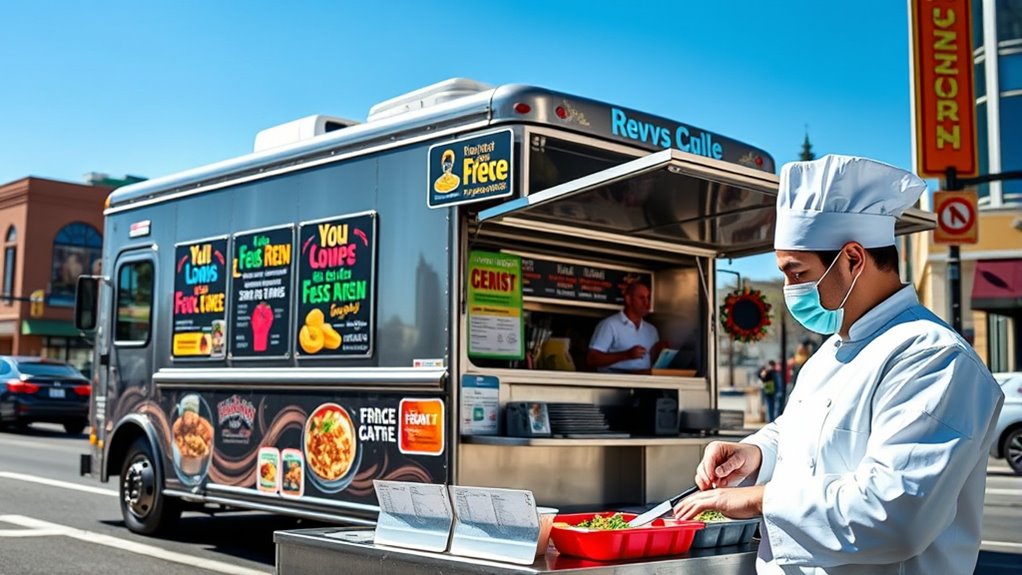
Developing a compliant menu and maintaining food safety standards are vital steps in operating a successful food truck in Reno. Your menu must be included in your initial plan review and approved by Nevada health authorities. Any changes require reporting to assess food risk impacts, especially for time/temperature control safety (TCS) foods, which demand proper hot and cold maintenance. Limit on-board prep, supported by a designated servicing area, is essential. You must use approved sanitation materials, potable water, and proper wastewater disposal, with mobile units equipped with hot and cold water heaters. Maintain adequate lighting and guarantee all surfaces and equipment are sanitation-compliant. Regularly update your service routes, and understand that health inspections depend on your menu’s risk level. A well-designed, safe menu is key to compliance and customer trust. Adhering to state and local regulations is critical for ongoing success and avoiding penalties. Additionally, implementing comprehensive food safety protocols can help prevent contamination and ensure compliance with health standards.
Strategies for Marketing Your Food Truck Business
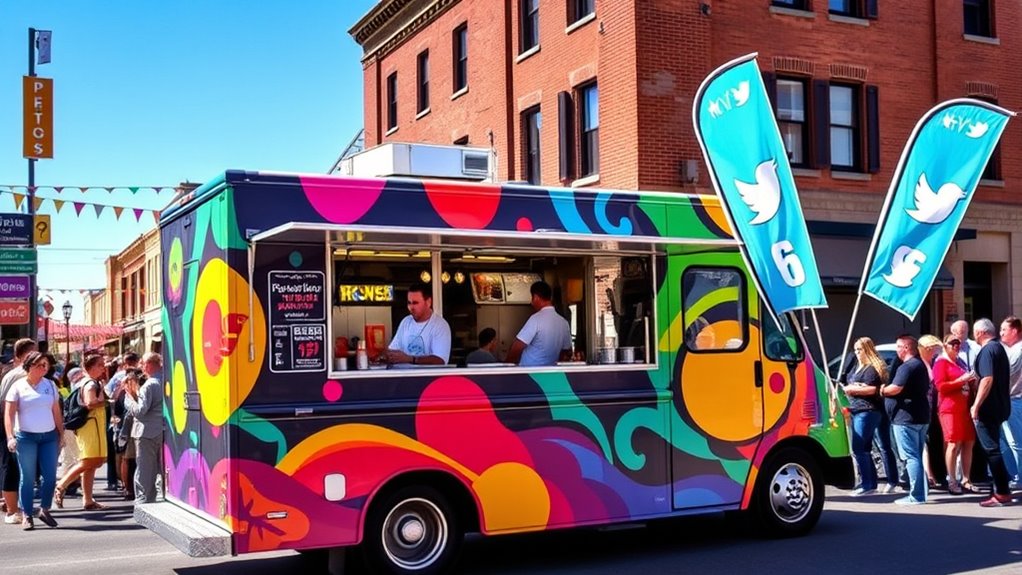
To successfully market your food truck in Reno, you need to harness social media platforms like Facebook to boost visibility and engage customers. Partnering with local events and festivals can also increase foot traffic and build brand recognition. Additionally, developing eye-catching branding helps attract attention both on the street and online, making your truck memorable. If you plan to expand your offerings, considering a variety of menu options can appeal to a wider audience and increase sales.
Leverage Social Media Platforms
Leveraging social media platforms is essential for maximizing your food truck’s visibility and attracting customers. Focus on creating high-quality food photos and engaging videos like reels to draw followers and convert them into patrons. Consistent posting on Instagram and Facebook keeps your audience interested and reinforces your brand. Share behind-the-scenes content to build personal connections and authenticity. Use platform-specific formats—like Instagram reels or Facebook stories—to boost engagement. Prioritize platforms where your target audience is most active; Instagram excels for visual content, while Facebook supports promotions and event updates. Respond promptly to comments and messages to foster relationships. Share location updates, daily specials, and user-generated content to encourage visits. Paid ads and online listings further expand your reach and improve your visibility in Reno’s local market. Additionally, analyzing engagement metrics regularly helps optimize your content strategy to better meet your audience’s preferences, and audience engagement is a key factor in increasing your overall marketing effectiveness.
Partner With Local Events
Wondering how to boost your food truck’s visibility in Reno? Partnering with local events is a smart move. Here’s how:
- Collaborate with fundraisers and charity events to attract community support and showcase your brand, ensuring you meet event-specific requirements like setup times and utilities. Building relationships with local organizers can also open doors to future collaborations and consistent event participation.
- Participate in food truck festivals like Food Truck Friday or Feed the Camel to reach diverse crowds, try new menu items, and gain social media exposure through organizer shares.
- Align with large-scale community events and marathons to serve high volumes quickly, boosting visibility among active, health-conscious audiences and establishing steady revenue streams. These partnerships can also help you build a loyal customer base in your community.
Building these partnerships enhances your local presence, creates word-of-mouth buzz, and helps your food truck become a community staple. Additionally, understanding local regulations and obtaining necessary permits ensures smooth operations at these events.
Develop Eye-Catching Branding
Developing eye-catching branding is essential to making your food truck stand out in Reno’s competitive scene. Your visual identity should be consistent across your truck, packaging, logo, and marketing materials to boost recognition and trust—cohesive design can increase recall by up to 75%. Use storytelling to embed your brand’s personality and mission, turning casual customers into loyal fans. Invest in professional food photography to make dishes irresistible, and incorporate bold graphics and colors on your truck exterior to attract foot traffic. Leverage social media with branded posts, videos, and influencer collaborations, focusing on peak engagement times. Consider themed promotional campaigns, loyalty programs, and local partnerships to create buzz. Here’s a quick overview:
| Strategy | Key Action | Impact |
|---|---|---|
| Visual Identity | Consistent logo, colors, packaging | Builds brand recognition |
| Content Creation | Quality photos, videos, storytelling | Increases engagement |
| Social Media | Contests, influencer marketing | Boosts reach and loyalty |
| Promotional Campaigns | Loyalty programs, themed events | Drives repeat business |
| Cultural Marketing | Local themes, experiential activations | Differentiates your brand |
Additionally, with over 40% of food truck consumers being under age 45, tailoring your branding to appeal to this younger demographic can significantly boost your visibility and customer loyalty. Incorporating astrological compatibility insights into your branding strategies can also help you better understand your target audience’s preferences and foster meaningful connections.
Ensuring Ongoing Compliance and Operational Best Practices
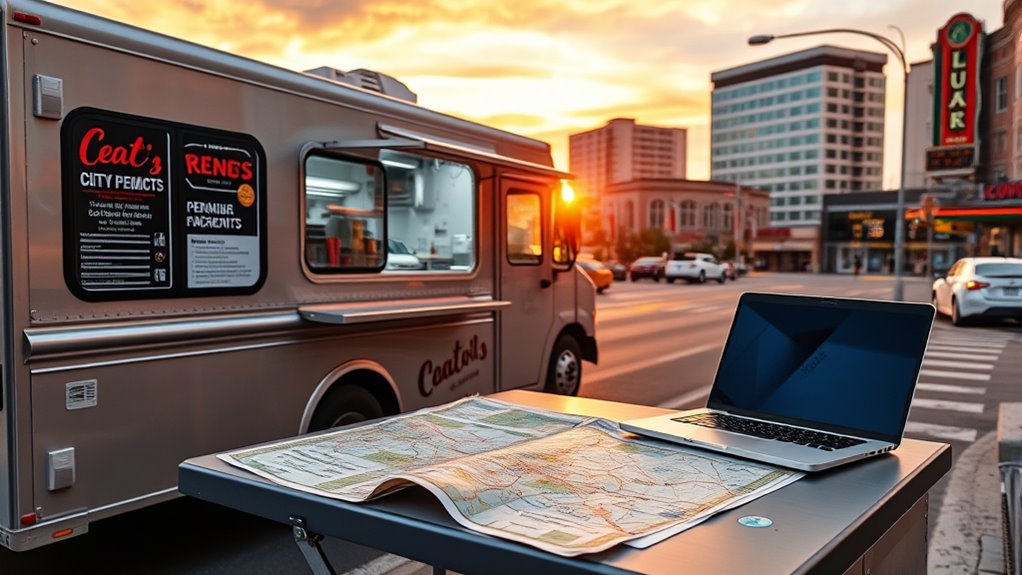
Maintaining ongoing compliance and following operational best practices are essential for the success and legality of your food truck business in Reno. To stay compliant, you need to:
Ongoing compliance and best practices are vital for your food truck’s success and legality in Reno.
- Regularly pass health inspections by submitting to initial and annual reviews, and promptly address any violations.
- Ensure your truck and servicing areas meet all safety standards, including proper refrigeration, waste disposal, and sanitation.
- Keep all employees trained with current food handler cards and enforce strict hygiene protocols.
- Invest in best vacuums for dust removal in 2024 to maintain a clean environment that meets health standards and ensures customer safety.
Additionally, avoid operating from unapproved locations or private residences. Maintain your vehicle and equipment through regular cleaning and maintenance. Properly manage waste using authorized disposal services, and stay updated on local regulations to prevent penalties. Following these practices safeguards your business and ensures smooth ongoing operations.
Frequently Asked Questions
Can I Operate a Food Truck Without a Permanent Physical Storefront?
Yes, you can operate a food truck without a permanent storefront in Reno. You need a health permit from NNPH and must serve from approved mobile or temporary locations, like West Street Plaza. You can’t operate out of private residences or unapproved areas. Make sure to follow parking rules, operate within designated service times, and pay daily fees for city locations. Proper licensing and compliance guarantee your mobile food business runs smoothly.
Are There Size Restrictions for Food Trucks in Reno?
You might be surprised to find that Reno doesn’t impose strict size limits on food trucks, but your vehicle still needs to fit within certain regulations. Your truck must comply with vehicle size laws, and its size is limited by design, safety, and health standards. You’ll need permits that consider your truck’s dimensions, and parking restrictions will also indirectly influence your size choices. So, keep your vehicle within these guidelines to stay compliant and operational.
How Do I Transfer My Permits if I Move Locations?
When you move locations, you can’t transfer your permits directly. You need to notify the local health authority immediately and stop operations until you submit a new Servicing Area Agreement, pay fees, and pass an inspection at the new site. Confirm the new area has proper facilities, and provide a signed agreement. This process guarantees your mobile food unit remains compliant and allows you to continue serving customers legally.
What Are the Insurance Requirements for Food Truck Operations?
You need to meet Nevada’s insurance requirements for food trucks. This includes carrying at least $750,000 in commercial auto liability coverage to protect against accidents. You also must have workers’ compensation insurance if you have employees, covering injuries and wages. Additionally, verify your business property insurance covers your equipment and vehicle damage. These coverages help protect your business from financial risks related to accidents, injuries, and property damage.
Can I Serve Alcohol From My Food Truck Legally?
Think of your food truck as a vessel carrying not just food, but legal responsibility. You can serve alcohol legally, but only if you secure the proper Nevada liquor license and local permits. You must follow strict rules—no serving minors, responsible alcohol service, and compliance with health and safety codes. Obtain approval from local authorities, and remember, breaking these rules risks fines or closure, so stay within legal boundaries to keep your journey smooth.
Conclusion
Starting your food truck in Reno requires research, planning, and persistence. By balancing permits, locations, menus, and marketing, you’ll build a booming business. Stay savvy with safety standards, streamline your strategy, and sustain success through smart, steady steps. With dedication and detail, your delicious dreams will drive you toward a thriving, tasty, and trending food truck empire in Reno.
